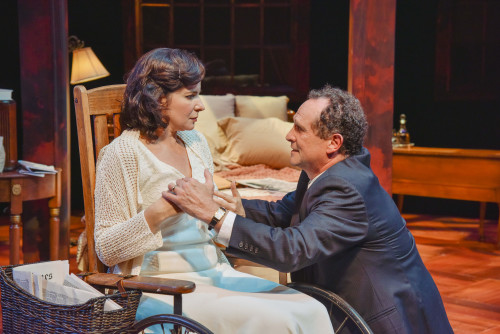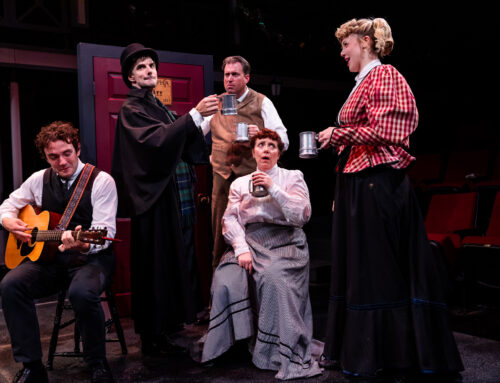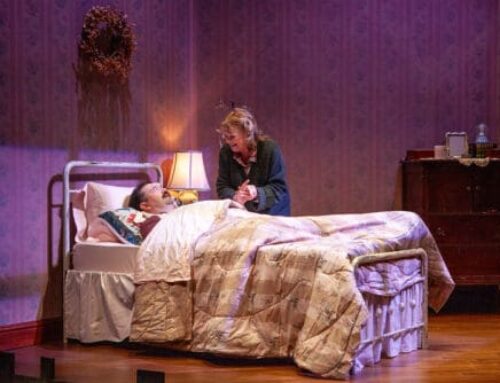Take a deep breath and get ready for the season opener at the New Repertory Theatre: BROKEN GLASS. It’s a potent dose of Arthur Miller, 1994, and a play that has never been performed in the Boston area before. It’s set in 1938 and in Germany it’s Kristallnacht, the so-called “Night of Broken Glass,” when the windows of Jewish-owned businesses were smashed. But it’s somewhere in Brooklyn that we’re left to pick up the pieces of a shattered marriage and begin to assemble the emotional and psychic mystery at it’s core.
It seems that Sylvia Gellburg (Anne Gottlieb) after reading about the antisemitism across Germany, has suddenly lost the ability to walk. The play opens with her desperate husband Phillip (Jeremiah Kissel) who has rushed to consult with a Doctor Hyman (Benjamin Evett) in the hopes of finding a reason and a cure for his wife’s baffling paralysis. Doctor Hyman attempts to break through, as it were, with a mixture of standard medical procedure and amateur psychoanalysis. He has an idea that Sylvia’s illness is an hysterical reaction rooted in her unconscious fears–but what is she afraid of, and why is she so obsessed with what is happening to the Jews thousands of miles away?
It turns out that a lot is happening under her own roof, that both she and her husband have been blind to, though the audience has a pretty good window on what’s going on. The play smartly helmed by artistic director Jim Petosa unfolds in two acts, on a darkly evocative turntable of a set, each scene revolving around revelation. Phillip is full of self-loathing, and as a successful and solitary Jewish employee of an old world firm, he is simultaneously proud of his Jewishness and embarrassed by it, seeing antisemitism everywhere, even where it might not exist.
Kissell is superbly irascible in the part, his short fuse is sometimes funny, but more often tragically self-destructive. He grows increasingly ill and ill at ease as the play unfolds; Kissell perfectly calibrates his character’s heartbreaking unraveling. The doctor’s wife, Margaret appealingly played by Eve Passeltiner is a model of patience and good-natured sobriety. We understand how she puts up with her husband the good doc who has a history as a ladies’ man and isn’t beyond climbing into bed with, literally, with Sylvia to examine her paralyzed limbs up close. Ben Evett while not yet in full possession of his lines, has a good grip on his character’s smooth ambiguity, even though the part is overwritten.
Finally there’s Anne Gottlieb’s tormented Sylvia, a beautiful, intelligent woman who seems terrified by the dictator abroad, but who has allowed herself, much closer to home, to be crippled by the unwitting dictates and self-hatred of the tortured, insecure man she loves. Gottlieb is strong and vulnerable, sensual and sad all at once as Sylvia mourns the life she feels she has wasted.
The play uses antisemitism as a way to explore the nature of identity. Miller unwraps, sometimes too diagrammatically, a spiraling maze of guilt, retribution, and redemption as he explores the ultimate dilemma, how we manage our given natures, trailing “20,000 years of human history,” with our specific life circumstances, and that of a partner who’s doing the same, all within the context of a marriage. The play is at once exhausting and absorbing, occasionally melodramatic, but ultimately ringing true.
Arthur Miller’s BROKEN GLASS is part of a national celebration of the playwright’s 100th birthday. See it at the NEW REP through September 27!







[…] Theater: Broken Glass A Review from Joyce Kulhawik […]